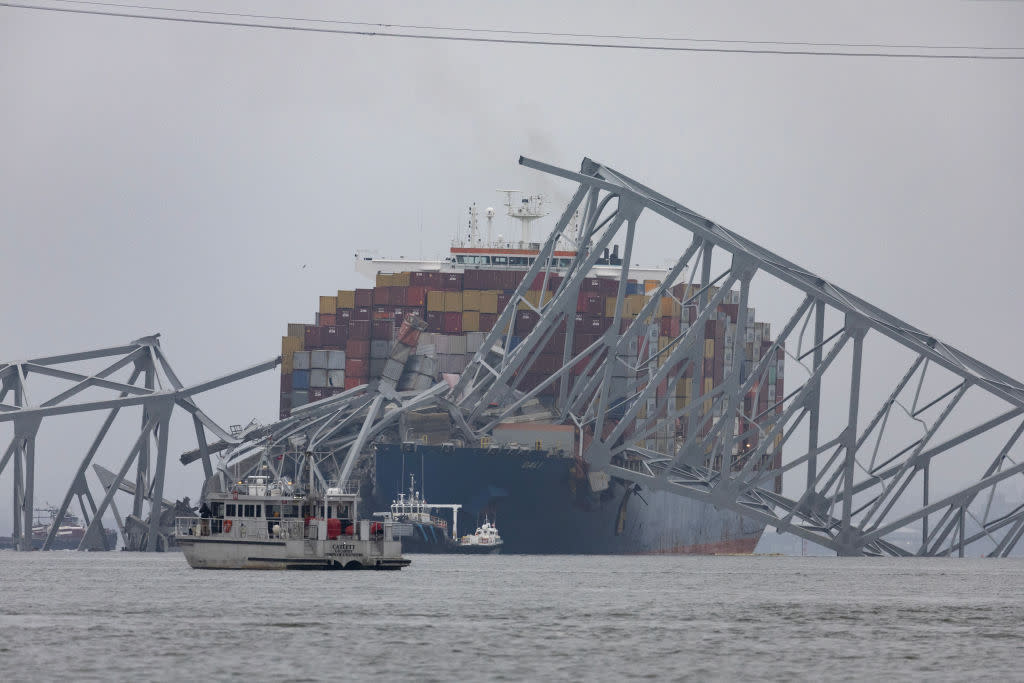How the Baltimore Bridge Recovery Will Be a Key Test for Biden

Shortly after a cargo ship crashed into Baltimore's Francis Scott Key Bridge on Tuesday, Republican Congresswoman Nancy Mace attempted to blame President Joe Biden’s infrastructure policies for the bridge’s catastrophic collapse.
"Look at the $1.2 trillion infrastructure bill that was done a couple of years ago that the Left hails as this massive success,” the South Carolina representative told Newsmax. “It was mostly a Green New Deal.” She pointed out that only a portion of the money allocated by Biden’s infrastructure bill—$110 billion out of $1.2 trillion total—went towards roads and bridges like the one in Baltimore. “We're not spending it on roads and bridges,” Mace said.
Her comments highlight how some Republicans have seized the Baltimore tragedy, which has left six people presumed dead, to criticize what they perceive as misplaced priorities in the Biden Administration's infrastructure agenda. The response to the collapse is quickly becoming a critical test for Biden, who has championed infrastructure improvements as a cornerstone of his presidency and aims to convince voters ahead of the November election that he’s the best equipped to address infrastructure challenges.
“Fairly or unfairly, the Biden Administration will be judged by how quickly it can line up funding and how quickly it can rebuild the bridge,” says Andy Winkler, an expert in disaster and infrastructure issues at the Bipartisan Policy Center.
Read More: 6 Construction Workers Presumed Dead. Baltimore Bridge Collapse: What to Know
As recovery operations continue, Biden announced on Tuesday that he directed his team to "move heaven and earth" to reopen the port and rebuild Baltimore's Francis Scott Key bridge "as soon as humanly possible.” The President also said it’s his “intention that the federal government will pay for the entire cost of reconstructing that bridge” and he expects Congress to support him.
Moving quickly to rebuild the bridge could help Biden politically and give him another opportunity to illustrate the urgency of his infrastructure agenda while he campaigns for re-election, says Len Foxwell, a Baltimore-based Democratic strategist. “As terrible as this is, it gives the President and his team a chance to use this as a cautionary tale of what can happen to jobs, supply chains, and transportation mobility if something were to happen to our network of highways, bridges and overpasses,” he says. “The world is going to be watching to see how long it takes for us to rebuild and to repair. And to the extent that this Administration can demonstrate the ability to get that process started with alacrity, they will benefit politically.”
Over the last two years, Biden and key members of his Administration have been trying to sell voters on the benefits of his infrastructure policies, traveling the country to tout his passage of the 2021 bipartisan infrastructure bill—which provides tens of billions of dollars to projects including rail tunnels under the Hudson River, Everglades restoration, and bridge replacements. The White House says it’s the largest investment in repairing and reconstructing bridges since the interstate highway system was fully constructed in 1992.
But convincing voters that these infrastructure investments have directly improved their lives could be a challenge for the Biden campaign. A year after the infrastructure bill passed, polls showed that most Americans had no idea Congress even passed the legislation—and now a massive and fatal bridge collapse has seized national headlines.
Still, Foxwell doesn’t think the outcome of the 2024 election will be decided on the issue of infrastructure unless there’s a demonstrable economic impact in the coming months, such as widespread job loss or increased grocery prices because of the collapsed bridge. “I don’t think it’s enough to influence the political behavior of voters,” he says, “but it gives Biden a renewed, perhaps fresh, opportunity to reinforce to the electorate why infrastructure was so important in the first place.”
While initial investigations suggest the bridge was fully up to code, the impact of the collapse extends beyond immediate safety concerns. The port plays a pivotal role in vehicle shipping and employs over 15,000 workers, with ripple effects expected to be felt in neighboring states like Pennsylvania, a crucial swing state for Biden. Some 850,000 vehicles go through the port annually and more than 30,000 vehicles cross the bridge daily. A prolonged bridge closure, Winkler says, would have far-reaching consequences for the regional economy and local businesses.
“I think in moments like this people want to see presidential leadership, but in our federal system incidents like this require more of a partnership between local state and federal officials,” Winkler says. He expects the cleanup could take weeks, while it may take several years to fully rebuild the bridge. Transportation Secretary Pete Buttigieg acknowledged Tuesday that rebuilding “will not be quick” and “will not be inexpensive.”
Sawyer Hackett, a Democratic strategist, dismissed attempts from Republicans to tie the bridge collapse to broader infrastructure debates. “The idea that Joe Biden is personally responsible for a 95,000-ton ship colliding with a bridge is ridiculous to anyone not living in a rightwing media bubble,” he says. “This has nothing to do with infrastructure.”
Write to Nik Popli at nik.popli@time.com.


